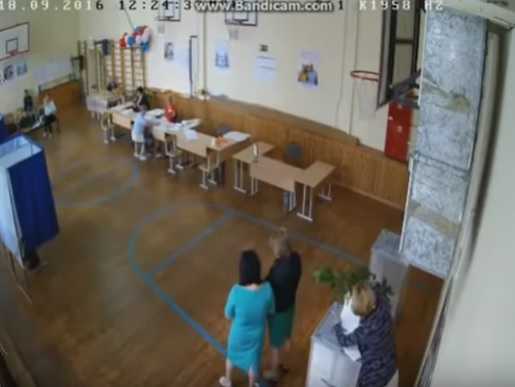Crimean Residents Vote in Russian Elections, Reluctantly

Screenshot from the surveillance camera footage at one of the polling stations. Two commission members are standing on guard while the third one is stuffing multiple ballots in a ballot box.
Article by Eleanor Knott
For the first time since Russia annexed Crimea, Russian elections were held on the territory of the disputed peninsula. That elections were held in Crimea has been a source of contention between Russia and the international community. OSCE election observers refused to monitor the polls in Crimea, and the US and EU condemned the September 18 elections as illegal and illegitimate. Ukraine has called for sanctions to be placed on those elected from Crimea to the Duma.
Unsurprisingly, Russia’s leading party, United Russia, swept the floor in Crimea, with United Russia candidates winning all three single-mandate seats in Crimea, capturing over 65 percent of the vote, and the single-mandate seat in Sevastopol.
In Sevastopol, the election almost appeared competitive. United Russia’s candidate received only 34 percent ahead of Oleg Nikolaev, who received 22 percent as the Party of Growth’s (Partiia Rosta) candidate, a largely pro-Kremlin party. The “ex-Muscovite” Nikolaev, who has lived in Sevastopol since 2010, was involved in Crimea’s annexation in 2014. He is an ally of Alexander Chaly, who was de facto head of Sevastopol’s city council after annexation.
In Crimea, the United Russia candidates were primarily locals, born in Simferopol, Crimea’s administrative capital. Andrei Kozenko, who won the Simferopol district, was formerly leader of the youth wing of Crimea’s pre-annexation fringe pro-Russian party, Russian Unity (Russkoe Edinstvo). Russian Unity was key in facilitating Russia’s annexation of Crimea’s on the ground in 2014; its leader, Sergei Aksyonov, become Crimea’s de facto leader following annexation.
However, a deeper examination of the Duma elections in Crimea shows an odd picture of a peninsula that Russia claimed experienced a “spring” and enthusiastic return to Russia just two years ago.
First, there are about 100,000 fewer registered voters in Crimea in 2016 as compared to the 2014 referendum and 2012 Ukrainian parliamentary elections. What explains this decline remains unclear: whether mass post-annexation emigration, refusal or inability to gain Russian citizenship, or to register as a voter, or a combination of all three.
Second, turnout was low: around 47 percent in Crimea, similar to Russian turnout overall, and 44 percent in Sevastopol. Turnout in Crimea was not dissimilar to turnout in Ukrainian elections before annexation. However, it is a far cry from the 83 percent turnout for the 2014 annexation referendum, as alleged by Crimean authorities at the time. Turnout was also low despite the fact that there were allegations of extreme incentives to participate, from cinema tickets in Yalta to smartphones in Evpatoria.
Third, turnout varied massively. Before the elections, Crimean Tatar leaders urged their community to boycott the elections. This did not deter Remzi Ilyasov, the leader of Qirim—a Crimean Tatar organization aligned with Crimea’s post-annexation authorities—from claiming that he expected 60 percent of Crimean Tatars to participate.
Such claims proved extremely optimistic. In several villages—such as Pionerske—and suburbs of Simferopol with high Crimean Tatar settlement, turnout was as low as 7-8 percent, indicating that the boycott may have been a reality.
By contrast, the highest turnout (up to 60 percent) was not in regions with more pro-Russian sentiment, such as Sevastopol, the “Russian city” (Russkii gorod) and site of the heralded Black Sea Fleet, but in Crimea’s small and more isolated northern towns such as Rozdolne and Pervomaiske. It is unclear what explains this higher turnout, whether real or fraudulent.
Finally, some reports demonstrate a lack of interest in the elections, as if there was little belief that much could change or be changed by participating, despite concerns of rising prices since annexation.
Overall, it is important for the international community to denounce the holding of Duma elections in Crimea as illegal and illegitimate, and it is important to refute Russia’s use of elections to normalize Crimea as a de facto part of Russia. But it is also prudent to recognize that the Duma elections do not indicate resounding support for the post-annexation authorities and Putin’s regime.
Low turnout across Russia indicates a systematic slowing of support for United Russia. Crimea’s annexation may have given the Putin’s Russia an initial “hit of cocaine,” but domestic economic paralysis and international isolation are becoming a sobering reality for the Kremlin.
Eleanor Knott has just completed her PhD in political science on ethnic politics in pre-annexation Crimea at the London School of Economics. She tweets at @ellie_knott.
Source: http://www.atlanticcouncil.org

